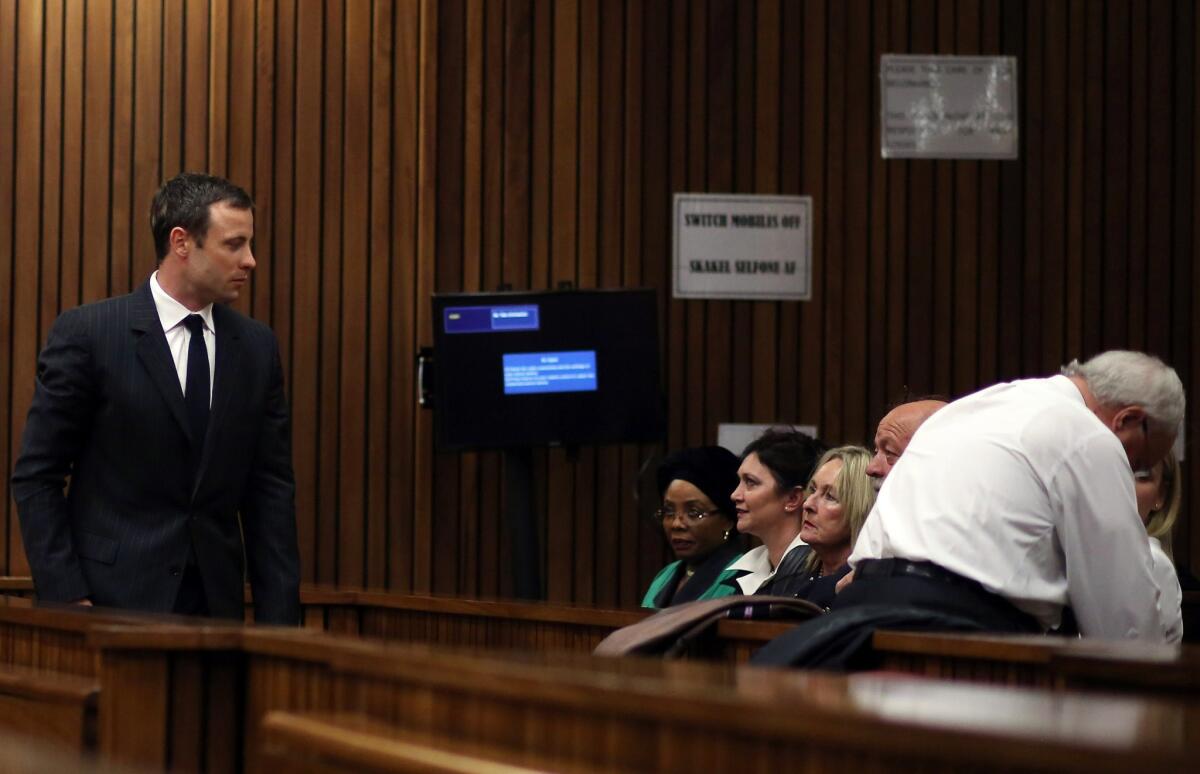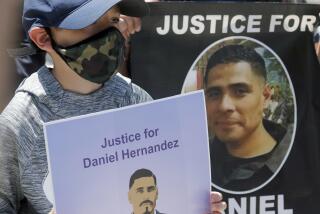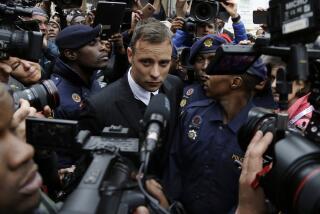Pistorius felt vulnerable, anxious before shooting, defense says

South African athlete Oscar Pistorius, left, looks at June Steenkamp, third from left, and Barry Steenkamp, the parents of Reeva Steenkamp, whom Pistorius shot and killed last year.
The lawyer for Oscar Pistorius told a Pretoria high court judge Friday that the South African Olympian should be acquitted of killing his girlfriend, Reeva Steenkamp, because he acted reasonably when he fired four shots through a locked bathroom door after he heard a noise inside.
Summarizing the defense’s case, attorney Barry Roux said the double-amputee runner was highly anxious when he armed himself and headed toward the bathroom, believing he was firing at an intruder instead of Steenkamp, who was inside. Roux argued that Pistorius was not guilty of murder or a lesser charge of culpable homicide.
“Was he negligent? Was he acting reasonably in discharging the firearm or would the reasonable person have acted differently? It’s a value judgment,” the lawyer said, telling Judge Thokozile Masipa that Pistorius’ actions after the shooting — when he wept and prayed — were inconsistent with him having intended to kill Steenkamp.
The prosecutor, Gerrie Nel, declared in his closing argument that the killing took place after an argument between the couple in the early hours of Valentine’s Day last year. Even if Pistorius thought he was firing at a burglar, Nel added, he should be found guilty of murder.
“The accused intended to kill a human being. That was his intention. If he aimed at the toilet knowing it would kill someone in the toilet, then it’s murder,” the prosecutor said Friday. “There must be consequences.”
The day before, Nel had begun his closing statement by saying that Pistorius, the first Olympic athlete to compete with two prosthetic legs, had “dropped the baton of truth” by giving an unlikely, contradictory account of what happened the night he killed his girlfriend.
Pistorius will learn his fate — guilty of murder or negligent killing, or acquittal — when the judge delivers her verdict Sept. 11. If he is convicted, there were be more hearings on possible mitigation of the sentence.
The defense contends that it would not make legal sense to convict Pistorius of murdering Steenkamp if he didn’t intend to kill her, even if he thought firing the expanding bullets, designed to cause maximum tissue damage, would probably kill a burglar. Pistorius asserted that he never intended to pull the trigger or kill anyone.
On Thursday, Nel described Pistorius as “an appalling witness” who was argumentative and vague as well as deceitful. Roux conceded that his client was not an ideal witness.
“Was he argumentative? Yes, my lady,” Roux said to the judge. “Should he have been? Absolutely not, but he was apprehensive.” The lawyer said there were “two Oscars,” and that the athlete’s powerful, confident exterior concealed a deeply anxious individual.
While the prosecution maintained that Pistorius performed badly on the witness stand because he was lying, Roux focused on the athlete’s depression and disability.
Describing the shooting scene, Roux said: “Now you’re standing at the door, you’re vulnerable, you have the effects of a slow burn over many years. You’re anxious. You’re trained as an athlete to react to sound. He stands now with his trigger ready to fire if necessary.” At that point, Roux brought his hand down on his lectern with a bang, symbolizing the noise that he said startled Pistorius.
Pistorius testified that he shot in fright when he heard a noise from the toilet that made him think someone was coming out to attack him, although the door didn’t open.
The court must decide whether Pistorius acted unconsciously, based on the athlete’s assertion he never intended to pull the trigger, or whether he acted reflexively but partly consciously. If it was just a reflexive shot, it meant that Pistorius lacked criminal capacity at the time he fired, Roux said, referring to the defense of temporary criminal incapacity, or temporary insanity.
In the prosecution’s closing argument, Nel argued that the deliberate action of Pistorius going to get his gun, making the decision to shoot, cocking the gun, walking five yards to the bathroom and then carrying out the plan amounted to premeditation.
In battered women cases, South Africa has recognized a temporary insanity defense as the basis for acquittal. Roux said that for Pistorius, there was a similar “slow burn” that came from years of knowing that he could never run from a fight.
“You’re a little boy, you experience daily that you cannot run away. You do not have a flight response. Over time you get an exaggerated fight response. That’s the slow burn. That constant reminder, ‘I do not have legs, I cannot run away. I am not the same,’” Roux said.
This explained why it was reasonable for Pistorius to approach the noise in the bathroom with a loaded gun, rather than retreating as an ordinary person might have done, he added.
More to Read
Start your day right
Sign up for Essential California for news, features and recommendations from the L.A. Times and beyond in your inbox six days a week.
You may occasionally receive promotional content from the Los Angeles Times.






